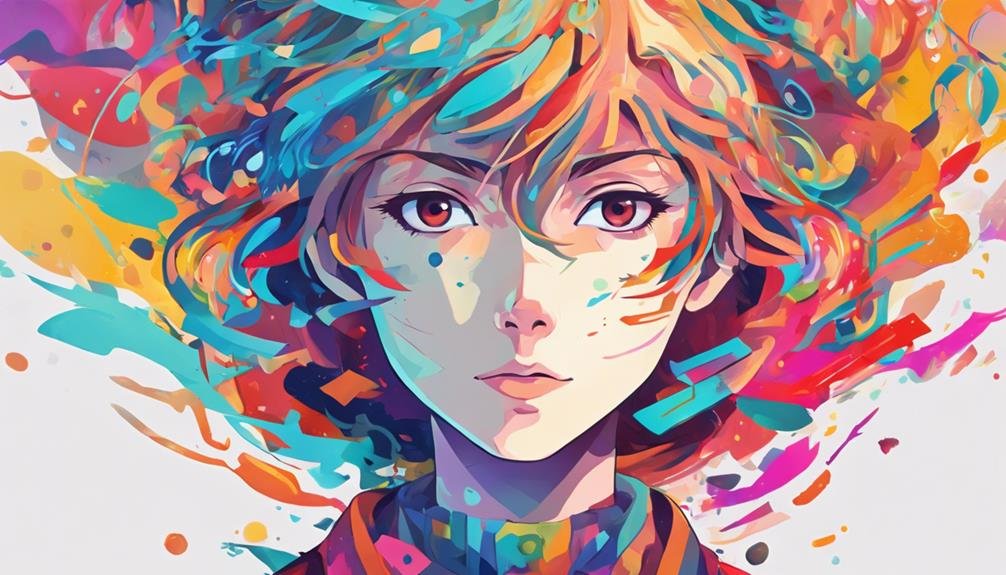The Link Between Emotional Intelligence and Creativity
Understanding the link between emotional intelligence and creativity reveals a profound connection. Your emotional awareness and empathy play essential roles in sparking innovative thoughts and guiding problem-solving. By embracing these elements, you can enhance your ability to think outside the box and incorporate diverse perspectives into your creative processes. Activating the potential of emotional intelligence can lead you to new levels of creative expression and artistry. By recognizing the impact of emotions on creativity, you open doors to deeper insights and innovative breakthroughs in your work. This connection offers a rich landscape for your creative endeavors.
Key Takeaways
- Emotional intelligence enhances creative problem-solving skills.
- Self-awareness and empathy fuel innovative thinking.
- Empathy fosters diverse perspectives in creativity.
- Effective communication is rooted in emotional intelligence.
- Emotional resilience stimulates out-of-the-box creativity.
Understanding Emotional Intelligence
To truly grasp the concept of emotional intelligence, one must explore the intricate web of emotions that govern human interactions and decision-making. Emotional intelligence revolves around self-awareness and empathy, the ability to recognize and understand one's own emotions and those of others. This self-awareness forms the foundation for effective communication and building strong relationships.
When you're in tune with your emotions and can empathize with others, you're better equipped to navigate social interactions and understand varying perspectives. This awareness allows you to communicate more effectively, fostering healthier relationships based on mutual understanding and respect. By recognizing your own emotional triggers and responses, you can manage conflicts more constructively and connect with others on a deeper level.
Emotional intelligence isn't just about how you perceive emotions but also how you respond to them in yourself and others. By honing your self-awareness and empathy, you can enhance your communication skills and cultivate more meaningful relationships built on trust and understanding.
Impact on Creative Thinking
By understanding the impact of emotional intelligence on creative thinking, you can enhance your problem-solving skills, enabling you to approach challenges with a fresh perspective.
Embracing emotional intelligence fosters innovative approaches, allowing you to think outside the box and generate unique solutions.
This connection between emotional intelligence and creativity stimulates a dynamic environment where new ideas flourish and creativity thrives.
Enhancing Problem-Solving Skills
Enhancing problem-solving skills can greatly impact your creative thinking abilities. When you develop strong problem-solving skills, you naturally become more adept at finding creative solutions to challenges that arise.
Problem-solving and creativity are closely intertwined; the ability to think outside the box and generate innovative ideas stems from a foundation of effective problem-solving. By honing your emotional regulation and empathy connection during problem-solving processes, you open up new pathways for creative thinking.
Understanding the emotions involved in a problem allows you to approach it from different perspectives, leading to unique and inventive solutions. Strengthening your problem-solving skills not only enhances your ability to navigate obstacles but also boosts your capacity for creative thinking in various aspects of your life.
Fostering Innovative Approaches
Enhancing your ability to foster innovative approaches can greatly impact your creative thinking skills and lead to groundbreaking solutions. When it comes to emotional intelligence in brainstorming and fostering creativity, your EQ plays an essential role in shaping the creative process. Here's how:
- Empathy and Collaboration: Understanding the emotions and perspectives of team members can lead to more inclusive and effective brainstorming sessions.
- Adaptability and Risk-Taking: Leveraging your EQ can help you embrace new ideas and take calculated risks, sparking innovation.
- Conflict Resolution Skills: Managing conflicts constructively by using emotional intelligence can clear the path for out-of-the-box thinking and creative breakthroughs.
Stimulating Out-Of-The-Box Thinking
To spark out-of-the-box thinking effectively, consider incorporating diverse perspectives and unconventional approaches into your creative process. Igniting creativity hinges on making novel brain connections, which can be nurtured through emotionally intelligent brainstorming sessions.
By welcoming different viewpoints and encouraging open dialogue, you can pave the way for breakthrough ideas to emerge. When you actively engage with individuals who bring varied experiences and insights to the table, you broaden your own mental horizons and invite innovative solutions to surface.
Embrace the discomfort of challenging traditional norms and exploring unconventional paths; this discomfort often signals the possibility of groundbreaking discoveries. Remember, the synergy of diverse minds working together can catalyze creative sparks that illuminate new pathways to innovation and original thinking.
Emotional Intelligence in Problem Solving
Understanding how emotional intelligence influences problem-solving processes is essential to unlocking the full potential of your cognitive abilities. When approaching problem-solving tasks, your emotional resilience plays a significant role in determining the effectiveness of your solutions. Here's how emotional intelligence impacts your problem-solving abilities:
- Emotional Resilience: Your ability to manage and bounce back from setbacks can greatly influence how you approach challenges. Emotionally resilient individuals are better equipped to stay focused and persistent when faced with difficult problems.
- Creative Solutions: Emotional intelligence can foster creativity by helping you think outside the box. By understanding and regulating your emotions, you can explore unconventional solutions and approach problems from different perspectives.
- Effective Communication: Emotional intelligence enhances your communication skills, enabling you to express your ideas clearly and empathetically. This can facilitate collaboration with others, leading to more innovative problem-solving approaches.
Enhancing Creativity Through EQ
You're about to discover how your emotional intelligence can be the key to igniting your creativity. By tapping into your EQ, you'll fuel that creative spark within you, paving the way for fresh ideas and innovative solutions.
Allow your emotional intelligence to unleash your full artistic potential and enhance your overall creative endeavors.
EQ Fuels Creative Spark
Emotional intelligence (EQ) plays a pivotal role in igniting the flame of creativity within you, fostering a deeper connection to your inner innovative spirit. When your emotional awareness is heightened, you're more likely to experience profound creative breakthroughs. Here's how EQ inspires artistic innovation:
- Heightened Perception: EQ enables you to perceive emotions accurately, leading to a deeper understanding of your own creative processes.
- Enhanced Self-Expression: By being in tune with your emotions, you can express yourself more authentically through your creative endeavors.
- Empathetic Collaboration: EQ fosters empathy, allowing you to collaborate effectively with others, sparking new creative ideas and approaches.
EQ Boosts Innovative Thinking
Boosting innovative thinking through emotional intelligence involves harnessing the power of your emotions to fuel your creative endeavors. When you combine EQ with brainstorming techniques, you can enhance your ability to generate and develop unique ideas. Emotional intelligence plays a vital role in ideation by helping you manage stress, stay open to different perspectives, and maintain a positive mindset during the creative process. By understanding your emotions and those of others, you can create a more conducive environment for innovation. Check out the table below to see how EQ influences your creative thinking:
| EQ in Innovative Thinking | Benefits | Challenges |
|---|---|---|
| Enhances idea generation | Encourages collaboration | Dealing with criticism |
| Improves problem-solving skills | Enhances empathy | Balancing emotions and logic |
| Fosters a positive work environment | Increases adaptability | Managing conflicts effectively |
EQ Unlocks Artistic Potential
Harnessing your emotional intelligence can unlock your artistic potential by nurturing a deeper understanding of your emotions and leveraging them to fuel your creative expression. Artistic intuition is heightened when you're in tune with your emotions, allowing you to interpret and convey them through your art more authentically.
Emotional mastery enables you to navigate the complexities of creativity with resilience and insight, turning challenges into opportunities for growth. Moreover, emotional connection acts as a catalyst for creativity, fostering meaningful interactions with your audience and evoking powerful responses.
EQ Strategies for Innovation
Implementing effective EQ strategies can greatly enhance the innovative capacity of individuals and teams. By incorporating innovation techniques and creativity strategies, you can foster an environment that nurtures groundbreaking ideas and solutions.
One key EQ strategy for innovation is fostering a culture of psychological safety within your team. When team members feel secure in expressing their ideas and opinions without fear of judgment, they're more likely to contribute unique perspectives and innovative solutions.
Another essential EQ strategy is practicing active listening. By truly understanding the perspectives and emotions of your team members, you can identify opportunities for innovation that may have otherwise gone unnoticed.
Additionally, managing stress and practicing resilience are vital EQ skills that can help individuals and teams navigate the uncertainties and challenges that often accompany the innovation process.
Cultivating Emotional Awareness
To enhance your emotional intelligence and foster creativity, developing a keen sense of emotional awareness is paramount. Emotional self-awareness allows you to recognize your own emotions, understand their impact on your thoughts and actions, and effectively manage them.
Empathy cultivation, on the other hand, enables you to understand and share the feelings of others, fostering better communication and collaboration. Here are three key ways to cultivate emotional awareness:
- Reflect on Your Emotions: Take time to identify and reflect on your emotions regularly. Consider journaling or meditation to help you become more aware of how you're feeling in different situations.
- Practice Active Listening: Engage in active listening when interacting with others. Focus on understanding their emotions and perspectives without judgment, which can help you develop greater empathy.
- Seek Feedback: Ask for feedback from trusted individuals to gain insights into how your emotions and actions impact them. Constructive feedback can be invaluable in enhancing your emotional awareness and empathy skills.
Emotions and Artistic Expression
Understanding the deep connection between emotions and artistic expression is important to unlocking the full potential of creativity. Emotions play a significant role in inspiring artistic endeavors. When you tap into your emotions, whether it's joy, sorrow, love, or even frustration, you're drawing from a well of inspiration that can fuel your creative process. These emotions serve as the catalyst for new ideas and innovative artistic expressions.
Artistic expression is closely intertwined with intuition. Your intuition guides you to make bold choices, experiment with different techniques, and push the boundaries of conventional art. It's through your intuition that you can deeply connect with your emotions and translate them into powerful artistic creations. By trusting your intuition, you can break free from self-imposed limitations and explore new territories of creativity.
EQ Practices for Creative Professionals
Emotions serve as powerful drivers for creativity, and for creative professionals, harnessing emotional intelligence (EQ) can greatly enhance their artistic endeavors. Developing EQ techniques can help you navigate the complex landscape of creative work, fostering a deeper connection between your emotions and your art.
To optimize your EQ for creativity, consider the following:
- Self-awareness: Cultivating self-awareness allows you to recognize your emotions, understand how they influence your creative process, and manage them effectively. Practice mindfulness to tune into your feelings without judgment, enhancing your ability to channel them into your work.
- Empathy: Empathy is key to creating impactful art that resonates with others. By honing your ability to empathize, you can better understand the emotions of your audience and infuse your work with universal themes that evoke powerful responses.
- Adaptability: Embrace a creativity mindset that welcomes change and experimentation. Stay open to new ideas, perspectives, and experiences, allowing your artistic expression to evolve and flourish. By adapting to different challenges and opportunities, you can push the boundaries of your creativity and produce truly innovative work.
Conclusion
As you reflect on the link between emotional intelligence and creativity, you begin to see the undeniable truth that understanding and managing your emotions can greatly enhance your ability to think creatively. By developing your emotional intelligence, you not only improve your problem-solving skills but also enhance new levels of innovation and artistic expression.
Embrace your emotions, cultivate your awareness, and watch as your creativity flourishes like never before. The connection between EQ and creativity is a powerful force waiting to be harnessed.








